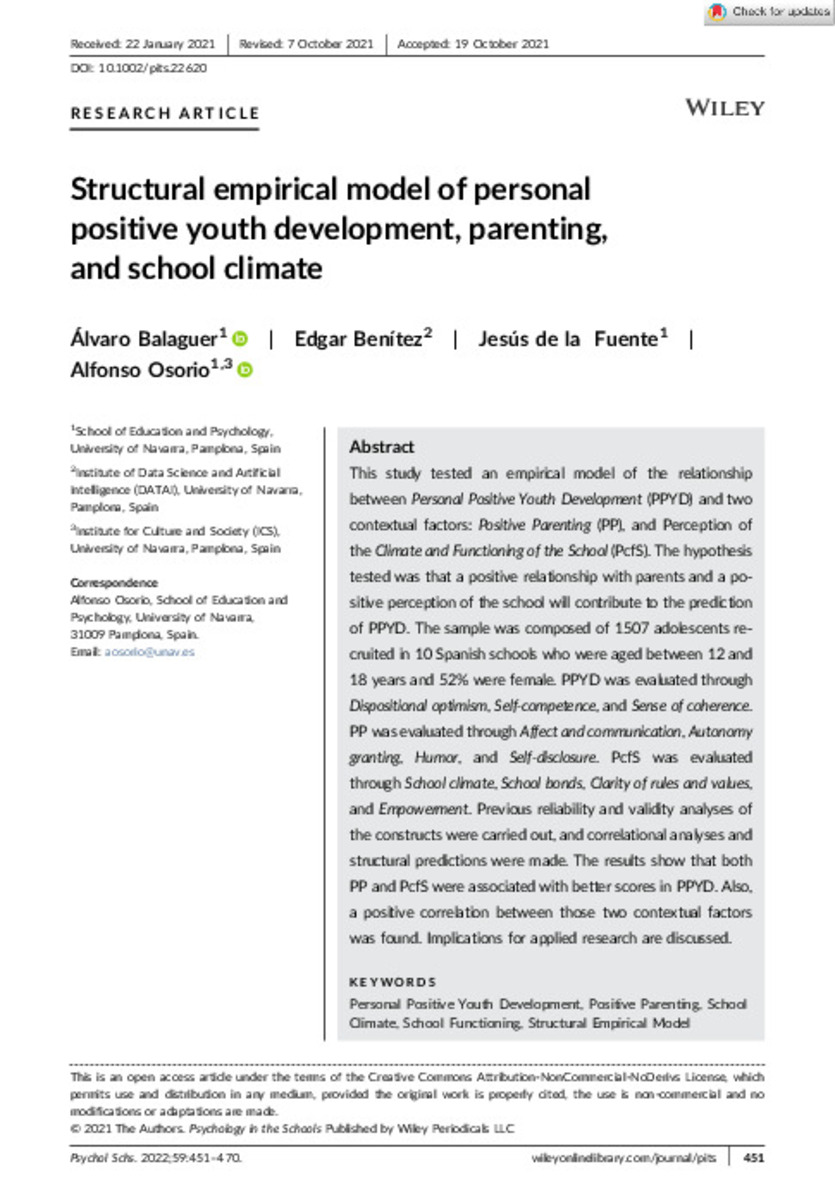Full metadata record
| DC Field | Value | Language |
|---|---|---|
| dc.creator | Balaguer-Estaña, A.J. (Álvaro J.) | - |
| dc.creator | Benítez-Sastoque, E.R. (Edgar Ricardo) | - |
| dc.creator | Fuente-Arias, J. (Jesús) de la | - |
| dc.creator | Osorio, A. (Alfonso) | - |
| dc.date.accessioned | 2022-02-11T10:11:43Z | - |
| dc.date.available | 2022-02-11T10:11:43Z | - |
| dc.date.issued | 2022 | - |
| dc.identifier.citation | Balaguer Á, Benítez E, de la Fuente J, Osorio A. Structural empirical model of personal positive youth development, parenting, and school climate. Psychology in the Schools. 2022;59(3):451-470. | es_ES |
| dc.identifier.issn | 0033-3085 | - |
| dc.identifier.uri | https://hdl.handle.net/10171/62907 | - |
| dc.description.abstract | This study tested an empirical model of the relationship between Personal Positive Youth Development (PPYD) and two contextual factors: Positive Parenting (PP), and Perception of the Climate and Functioning of the School (PcfS). The hypothesis tested was that a positive relationship with parents and a positive perception of the school will contribute to the prediction of PPYD. The sample was composed of 1507 adolescents recruited in 10 Spanish schools who were aged between 12 and 18 years and 52% were female. PPYD was evaluated through Dispositional optimism, Self‐competence, and Sense of coherence. PP was evaluated through Affect and communication, Autonomy granting, Humor, and Self‐disclosure. PcfS was evaluated through School climate, School bonds, Clarity of rules and values, and Empowerment. Previous reliability and validity analyses of the constructs were carried out, and correlational analyses and structural predictions were made. The results show that both PP and PcfS were associated with better scores in PPYD. Also, a positive correlation between those two contextual factors was found. Implications for applied research are discussed. Highlights: Positive Parenting has a positive association with Perception of climate and functioning of the School.Positive Parenting and better Perception of climate and functioning of the School both predict Personal Positive Youth Development.Positive Parenting is the most relevant predictor of Personal Positive Youth Development | es_ES |
| dc.language.iso | eng | es_ES |
| dc.publisher | Wiley | es_ES |
| dc.rights | info:eu-repo/semantics/openAccess | es_ES |
| dc.subject | Personal Positive Youth Development | es_ES |
| dc.subject | Positive Parenting | es_ES |
| dc.subject | School Climate | es_ES |
| dc.subject | School Functioning | es_ES |
| dc.subject | Structural Empirical Mode | es_ES |
| dc.title | Structural empirical model of personal positive youth development, parenting, and school climate | es_ES |
| dc.type | info:eu-repo/semantics/article | es_ES |
| dc.editorial.note | This is an open access article under the terms of the Creative Commons Attribution‐NonCommercial‐NoDerivs License, which permits use and distribution in any medium, provided the original work is properly cited, the use is non‐commercial and no modifications or adaptations are made. | es_ES |
| dc.identifier.doi | 10.1002/pits.22620 | - |
Files in This Item:
Statistics and impact
Items in Dadun are protected by copyright, with all rights reserved, unless otherwise indicated.






